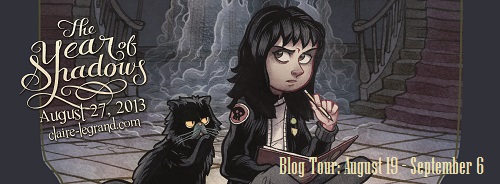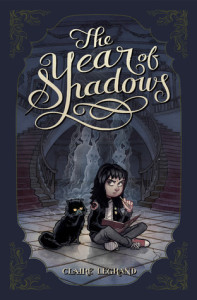Today, I am so happy to be part of The Year of Shadows blog tour! First, let me tell you a bit about the book:
The Year of Shadows
Author: Claire Legrand
Published August 27th, 2013 by Simon & Schuster Books for Young Readers
Goodreads Summary: Olivia Stellatella is having a rough year.
Her mother left, her neglectful father — the maestro of a failing orchestra — has moved her and her grandmother into his dark, broken-down concert hall to save money, and her only friend is Igor, an ornery stray cat.
Just when she thinks life couldn’t get any weirder, she meets four ghosts who haunt the hall. They need Olivia’s help — if the hall is torn down, they’ll be stuck as ghosts forever, never able to move on.
Olivia has to do the impossible for her shadowy new friends: Save the concert hall. But helping the dead has powerful consequences for the living . . . and soon it’s not just the concert hall that needs saving.
I am so excited to read this! One of the things that intrigues me the most is the setting of a concert hall; reminds me of Phantom of the Opera.
Today we are so lucky to have author Claire Legrand as a guest blogger. Claire Legrand used to be a musician until she realized she couldn’t stop thinking about the stories in her head. Now a writer, Ms. Legrand can often be found typing with purpose at her keyboard, losing herself in the stacks at her local library, or embarking upon spontaneous adventures to lands unknown. Her first novel is The Cavendish Home for Boys and Girls, a New York Public Library Best Book for Children in 2012. Her second novel, The Year of Shadows, releases August 27, 2013, with her third novel, Winterspell, to follow in fall 2014. She is one of the four authors behind The Cabinet of Curiosities, an anthology of dark middle grade fiction due out in July 2014 from Greenwillow Books/HarperCollins. Claire lives in New Jersey with a dragon and two cats. Visit her at claire-legrand.com and at enterthecabinet.com.
Here at Unleashing Readers, one of our goals is helping educators find books that will help them teach their students about different literary elements. We are so excited for Claire Legrand to discuss the literary elements of setting, characterization, and language, and how she utilized those elements to bring the world of The Year of Shadows to life! I think you all will find this post interesting and so useful.
SETTING
The sense of place in The Year of Shadows was one of the first story elements I established. Olivia’s world is an isolated one—she lives at Emerson Hall, she goes to school, she works after school at the tea shop across the street called The Happy Place. We don’t see a lot of Olivia’s city beyond those three locations, and the time spent at Olivia’s school and The Happy Place are relatively minimal. The Year of Shadows is really all about Emerson Hall. It’s not only where Olivia spends the majority of her time; it’s also her new home. I therefore knew I would have to make the Hall as vibrant a character as Olivia herself, full of moods and memories. The Hall needed to feel like a whole new world, one that Olivia explores in the new lens of “home” just as the readers are exploring it for the first time. The state of the Hall, and how Olivia perceives it, represents Olivia’s state of mind.
At the beginning of the story, Emerson Hall is decrepit, shabby, old. Its paint has faded, its carpet is torn, and the once-grand stone angels on the building’s façade have been vandalized. Like Olivia and her broken family, Emerson Hall has seen better days. Olivia directs her hatred of what her life has become at the Hall itself; to her, Emerson Hall and its orchestra lie at the root of her troubles. She doesn’t realize until much later that her refusal to reach out to friends for help and her destructive tendency to isolate herself are more problematic than living in Emerson Hall. Like Olivia and her family, Emerson Hall literally starts to fall apart as the story progresses. Both Olivia and her home undergo crises that could make or break them. It is Olivia’s realization that she and the Hall need each other if they are going to survive that marks a turning point in the story, and allows her to find a peace that, at the beginning of The Year of Shadows, she can’t imagine finding ever again.
CHARACTERIZATION
Imagine for a moment that you are twelve years old. You have enjoyed a comfortable, happy life with your father, mother, and grandmother. Art is in your blood; you are never without your trusty sketchpad, and you studied symphonies with your conductor father from the time you could crawl.
Then, things start to go wrong. Your mother and father start to fight; you lie awake at night listening to them. Your father spends more and more time working and less and less time with you and your mother. The orchestra isn’t doing well; lots of businesses aren’t doing well, and who wants to spend money they don’t have on coming to hear an increasingly crummy orchestra perform? Your stomach is in constant knots.
One day, a day that should have been like any other day, you wake up to find that your mother is gone. She left in the middle of the night without a clue as to her destination. It’s just you and your father now—your father who seems to care more than ever about work, much more than he cares about you. He lets bills and letters from your school pile up. (You’re not doing well in school these days.) He sells your house and moves you into the backstage storage rooms of a music hall that should probably be condemned.
You hate him. You hate everything. Sometimes, you even hate yourself.
This is Olivia. This is the girl whose story I sat down to tell when I wrote The Year of Shadows. She was a difficult character to bring to life; as you can see, her story isn’t a happy one. I needed to both communicate her (righteous, justified) anger and grief while still keeping her sympathetic. To achieve this, I balanced her darker moments—berating her father, insulting people who try to help her—with lighter ones. I felt it was even more important with Olivia than it was for some of my other, more immediately sympathetic characters, to give the reader peeks of the true her, beneath all the hurt that consumes her.
Olivia is an artist. There are beautiful worlds inside her, worlds she brings to life in her sketchpad even when—especially when—nothing else makes sense.
Olivia is kindhearted, devoted to her frail grandmother. She is determined to transform the backstage rooms of Emerson Hall into something like a home—decorating the bare gray walls with pictures from her sketchbook, spending the limited money she earns from working after school to buy her grandmother scarves and a nice warm rug for the cold floor.
Olivia is brave. She will face down ghosts—even the distinctly unfriendly ones—if it means defending her father, as much as she thinks she hates him. (But finding the courage to trust again? That she doesn’t find so easily.)
Creating Olivia was all about finding the right balance between her good moments and her bad ones, and ensuring that even her worst moments came from a place readers could understand.
The other characters in The Year of Shadows help Olivia in different ways. They are like rungs on the ladder Olivia must climb to pull herself out of her depression. Henry is trusting and loyal, traits Olivia can no longer see in herself or in her family. Joan is not afraid of being herself, or of letting others see her, while Olivia is constantly trying to hide. Mr. and Mrs. Barsky are the loving couple Olivia used to see in her parents. Trumpet player Richard Ashley is the love of music Olivia once had, and has now lost.
Even the ghosts play their part. I like to think of the four main ghosts in The Year of Shadows as fulfilling a function similar to that of the Ghosts of Christmas Past, Present, and Future in Dickens’s A Christmas Carol, each of which teach Ebenezer Scrooge something about himself. Olivia’s ghosts do the same, each “lesson” increasing in importance. Violinist Frederick helps Olivia rediscover her love of music. Best friends Tillie and Jax remind Olivia of the power and value of friendship. And poor Mr. Worthington, with his horrible secret, shows Olivia that even her family, as dysfunctional as it is, is worth saving.
LANGUAGE
Establishing just the right blend of language to tell Olivia’s story was a tricky process for me. I wanted the language of The Year of Shadows to feel contemporary yet classic, homey yet eerie. The reader needed to feel at home in Emerson Hall, but still feel as unsettled as Olivia does. There are horror elements in this book, but it is not a horror novel; it is ultimately a story about family and friendship. The language needed to both accurately describe intense issues—financial trouble, death and the afterlife, parental abandonment and neglect, bullying, depression—while still being accessible to young readers. Through the narration, I needed Olivia to identify and explore complex emotions; at the same time, I needed her to describe them in such a way that felt authentic for an emotionally confused twelve-year-old.
I think it’s impossible to discuss a story’s language without addressing voice, and establishing Olivia’s voice was essential in developing the right language for The Year of Shadows. I was fortunate to quickly “hear” Olivia’s voice—informal but poetic, intelligent but not book-smart, sarcastic yet brimming with emotion too overwhelming to share. Her voice is conversational, peppered with fragments.
Ultimately, I wanted the language of The Year of Shadows to evoke just that—shadows. Dark, shifting shapes on the wall created by fleeting sweeps of light. Shadows, while they might seem frightening at first, are ultimately hopeful things, because you can’t have a shadow without light. For Olivia, it takes a while to find her light—but she does in the end, even if it wasn’t quite what she was expecting.
Below are a few brief (spoiler-free!) selections from The Year of Shadows that are representative of the book’s overall language:
“The picture I had of them in my head was pretty fuzzy, so I kept drawing them over and over, trying to capture the memory of them on the page. It wasn’t working very well; it’s harder than you might think to draw just the right amount of transparency, of driftiness.”
“The Maestro didn’t cry. The Maestro was made of stone and numbers and anger, and mostly he was made of music—cold, unfeeling, metal-tubed music.”
“Mr. Worthington stared. His eyes and mouth were the largest, hanging open like gateways to some secret, dark place. His head didn’t hang quite right, like someone had screwed it on wrong, and he was skinny as a bundle of twigs.”
“The shades overhead scampered away, but one lingered above me, its face cocked to the side like a bird. It opened its mouth and groaned, this low, rumbling sound that made my ears hurt.”
“In a week and a half, we’d know the Hall’s fate. No, not its fate. Its destiny. I liked that word better. It sounded softer, like something Mom would say. It sounded like stars.”
“Henry didn’t say anything more after that. I think he was afraid to talk to me, afraid that I would crack. He might have been right. All I knew was the tip of my charcoal on my sketchpad, like I was sewing myself back together.”
I can see this post being used in reading or writing workshop; what a great resource for teachers! Also, doesn’t it make you want to read the book even more?!
I want to thank Claire Legrand for stopping by, and I hope you found the post as useful as I did!




This book sounds wonderful for my 6th graders! I’m looking forward to ordering it for my library.
Doesn’t it sound great?! I agree – middle schoolers will love it!
Don’t forget to enter into the giveaway 🙂
This post is a great resource and I can’t wait for the book. Loved the Cavendish Home for Boys and Girls!
The format of this entry is great. I like reading the author’s own words about her setting, characters, and language. The most fascinating thing to me is how authors create a setting that readers’ can live in throughout the entire book- it seems like it would take lots of imagination and details to get it just right. So my favorite line from above comes from the setting section: “The Hall needed to feel like a whole new world, one that Olivia explores in the new lens of “home” just as the readers are exploring it for the first time. The state of the Hall, and how Olivia perceives it, represents Olivia’s state of mind.”
Christina K. in the rafflecopter
LOVE this excerpt: ““In a week and a half, we’d know the Hall’s fate. No, not its fate. Its destiny. I liked that word better. It sounded softer, like something Mom would say. It sounded like stars.” It’s exactly what Claire said, intelligent, full of emotion, simple and clear.
I also love this: “Henry didn’t say anything more after that. I think he was afraid to talk to me, afraid that I would crack. He might have been right. All I knew was the tip of my charcoal on my sketchpad, like I was sewing myself back together.” LOVE the imagery of the charcoal tip and her redesigning herself, with a friend beside her that can help.
Thank you:)
I like the “the Maestro didn’t cry” excerpt because I ended up picturing a man literally filled with music notes. Haha
I liked this one; The Maestro didn’t cry. The Maestro was made of stone and numbers and anger, and mostly he was made of music—cold, unfeeling, metal-tubed music. i don’t know why, but I just REALLY like it.
Kendra in the giveaway above.
I liked the last one.“Henry didn’t say anything more after that. I think he was afraid to talk to me, afraid that I would crack. He might have been right. All I knew was the tip of my charcoal on my sketchpad, like I was sewing myself back together.”
I love them all, but anything with my beloved Mr. Worthington always takes first place.
“Henry didn’t say anything more after
that. I think he was afraid to talk to me, afraid that I would crack. He
might have been right. All I knew was the tip of my charcoal on my
sketchpad, like I was sewing myself back together.”
Mr Worthington seems really creepy!
“His eyes and mouth were the largest, hanging open like gateways to some secret, dark place.” Creepy, yet I totally get the visual. LOVE it!
“The Maestro didn’t cry. The Maestro was made of stone and numbers and anger, and mostly he was made of music—cold, unfeeling, metal-tubed music.”
I LOVE THAT! Such an interesting, different, and visually brilliant way to describe someone. Man, I’m so excited to read this one 😀
“Mr. Worthington stared. His eyes and mouth were the largest, hanging open like gateways to some secret, dark place. His head didn’t hang quite right, like someone had screwed it on wrong, and he was skinny as a bundle of twigs.”
I like ” the shades overhead scampered away…”good visual.
Thanks for sharing those snips, Claire! I’m even more eager now to read the book!
I really liked all the excerpts, but I think if I had to pick a favorite, I would pick “In a week and a half, we’d know the Hall’s fate. No, not its fate. Its destiny. I liked that word better. It sounded softer, like something Mom would say. It sounded like stars.” I am so looking forward to reading this!
Lovely post, Claire. Especially about language – I love the voice in books like these, modern yet with a timeless feel.